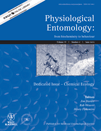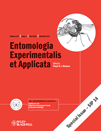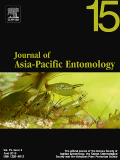
PHYSIOLOGICAL ENTOMOLOGY
Scope & Guideline
Unraveling the Secrets of Insect Life
Introduction
Aims and Scopes
- Insect Physiology:
Research on the physiological processes in insects, including metabolic pathways, hormonal regulation, and developmental changes, which are crucial for understanding their life cycles and adaptations. - Immunology and Disease Resistance:
Studies focusing on the immune responses of insects to pathogens and environmental stresses, exploring mechanisms of disease tolerance, immunity trade-offs, and the impact of external factors such as temperature and diet. - Nutritional Ecology:
Investigations into how diet affects insect physiology, reproduction, and survival, including the role of specific nutrients in life-history traits and the effects of dietary changes under various environmental conditions. - Behavioral Ecology:
Examinations of how physiological traits influence insect behavior, including foraging strategies, mating behaviors, and predator-prey interactions, often in the context of environmental challenges. - Environmental Adaptations:
Research that addresses how insects adapt physiologically and behaviorally to environmental changes, particularly regarding temperature fluctuations, chemical exposures, and habitat alterations.
Trending and Emerging
- Climate Change Impact:
Increasing studies address how climate change affects insect physiology, including thermal tolerance and stress responses, reflecting a broader concern for ecological implications and biodiversity. - Nutritional Physiology in Insects:
A notable rise in research focusing on the influence of diet on insect development, reproduction, and overall fitness, indicating a deeper understanding of the nutritional ecology of various species. - Molecular and Genetic Approaches:
There is a surge in the use of molecular techniques to explore genetic regulation of physiological processes, immune responses, and adaptations, highlighting a trend towards integrating modern biotechnology in entomological research. - Insect Immunity Mechanisms:
Emerging interest in the intricacies of insect immune responses, particularly in relation to environmental stressors and pathogens, suggests a growing recognition of the importance of immunology in ecological studies. - Microbiome Studies in Insects:
Research into the role of microbial communities in insect health and physiology is gaining traction, indicating an emerging understanding of the symbiotic relationships that affect insect biology.
Declining or Waning
- Chemical Ecology:
Research on the chemical interactions between insects and their environment, including pheromones and plant-insect interactions, has seen a decrease, possibly as researchers shift towards genetic and molecular approaches. - Insect Behavior Studies:
Although behavioral studies remain relevant, there appears to be a reduced emphasis on classical behavioral observations in favor of more quantitative physiological measures and molecular techniques. - Traditional Pest Management Strategies:
Research focused specifically on conventional pest control methods is waning, as there is a growing preference for integrated pest management approaches that consider ecological and physiological perspectives.
Similar Journals

ENTOMOLOGIA EXPERIMENTALIS ET APPLICATA
Unraveling the mysteries of the insect world.ENTOMOLOGIA EXPERIMENTALIS ET APPLICATA is a premier journal dedicated to advancing the understanding of insect science through innovative research and thorough experimental methodologies. Published by Wiley, this esteemed journal has been at the forefront of entomology since its inception in 1958, with its latest convergence extending until 2024. With a commendable Impact Factor and categorically positioned in the Q2 quartile across both Ecology, Evolution, Behavior and Systematics and Insect Science fields, it plays a pivotal role in the dissemination of critical findings. The journal is indexed in Scopus, ranking 43rd out of 181 in Insect Science, showcasing its relevance and stature within the academic community, while maintaining a robust visibility among scholars. Given its rigorous peer-review process and a commitment to quality and innovation, ENTOMOLOGIA EXPERIMENTALIS ET APPLICATA serves as a vital resource for researchers, professionals, and students aiming to deepen their insights into entomological research.

Journal of Experimental Zoology Part A-Ecological and Integrative Physiology
Transforming our understanding of environmental interactions.The Journal of Experimental Zoology Part A - Ecological and Integrative Physiology, published by WILEY, is a distinguished peer-reviewed journal focusing on ecological and evolutionary physiology, providing a robust platform for research that bridges both ecological and integrative physiological concepts. With an impressive impact factor and recognition as a Q1 journal in both Animal Science and Zoology and Ecology, Evolution, Behavior and Systematics in 2023, it positions itself as a leader in advancing our understanding of organismal biology and environmental interactions. The journal is committed to open access, offering researchers and professionals worldwide the opportunity to share and disseminate their findings freely. Since its inception in 2017, it has rapidly gained prominence—ranking within the top percentiles of Scopus Ranks across several disciplines, including genetics and molecular biology. This not only underscores its relevance but also highlights its vital role in facilitating interdisciplinary approaches essential for addressing contemporary biological challenges. Researchers, educators, and students alike will find in this journal a valuable resource for cutting-edge studies and innovative methodologies in the field.

INSECTES SOCIAUX
Innovating insights into the social structures of insects.INSECTES SOCIAUX, published by SPRINGER BASEL AG, is a prestigious international journal established in 1954, dedicated to advancing the field of insect science and ecology. With a robust ISSN of 0020-1812 and an E-ISSN of 1420-9098, INSECTES SOCIAUX maintains a significant impact within its category, boasting a Q2 ranking in both Ecology, Evolution, Behavior and Systematics and Insect Science. This journal serves as a vital platform for researchers and professionals looking to publish high-quality research that enhances our understanding of social insects, their behaviors, interactions, and ecological roles. Despite not being open access, INSECTES SOCIAUX remains a valuable resource, ensuring that critical scientific findings reach the broader academic community. With a comprehensive scope that merges diverse aspects of insect studies, this journal is essential for those engaged in ecological research and insect biology, facilitating an invaluable exchange of knowledge from its headquarters in Basel, Switzerland.

FISH PHYSIOLOGY AND BIOCHEMISTRY
Innovative Insights into Fish BiochemistryFISH PHYSIOLOGY AND BIOCHEMISTRY, published by Springer, is a leading journal in the fields of aquatic science, biochemistry, and physiology, with an impressive trajectory since its inception in 1986 and continuing through 2024. Operating from the Netherlands, this journal serves as a vital platform for researchers, professionals, and students alike, showcasing innovative studies that explore the physiological and biochemical aspects of fish, contributing significantly to our understanding of aquatic ecosystems and their inhabitants. With a robust impact factor reflected in its Q1 status in Aquatic Science and notable rankings in other relevant categories, FISH PHYSIOLOGY AND BIOCHEMISTRY maintains a strong scholarly influence, evidenced by its Scopus ranking within the top quartiles of various biological sciences disciplines. While the journal does not currently offer open access options, it remains a cornerstone for advancing knowledge and fostering collaboration within the community dedicated to aquatic biology and related fields.

CANADIAN ENTOMOLOGIST
Fostering Excellence in Entomological ResearchCanadian Entomologist, published by Cambridge University Press, is a prominent journal dedicated to the field of entomology, covering key areas such as insect science, ecology, and evolutionary biology. With its origins dating back to 1868, this esteemed journal has continuously contributed to the understanding of insect behavior, systematics, and physiology, engaging researchers and professionals alike. Although currently not an Open Access journal, it offers valuable insights through its rigorously peer-reviewed articles, reflecting its commitment to scientific excellence. The journal has garnered a respectable Q3 ranking in various categories, including Ecology, Evolution, Behavior, and Systematics, making it a critical resource for scholars and students who seek to explore the complex interactions within insect populations and their environments. Researchers can trust Canadian Entomologist to provide relevant and impactful research that shapes contemporary understanding in the realm of entomological studies, fostering the growth of this vital scientific discipline.

JOURNAL OF INSECT SCIENCE
Exploring the Intricacies of Insect LifeJOURNAL OF INSECT SCIENCE, published by OXFORD UNIV PRESS INC, stands as a pivotal platform in the field of insect science, offering open-access research since 2001. With an impactful presence in the academic community, this journal spans the convergence of entomology and various interdisciplinary studies, establishing itself in the Q2 quartile for both Insect Science and Medicine (miscellaneous) categories as of 2023. This esteemed journal is recognized for its contributions to the understanding and management of insect biology, ecology, and their implications for agriculture and human health, garnering a Scopus rank of 44 out of 181 in Agricultural and Biological Sciences. The Open Access model encourages wide dissemination of knowledge, making the rich repository of research accessible to a global audience. With ongoing publications until 2024, JOURNAL OF INSECT SCIENCE serves as an essential resource for researchers, professionals, and students seeking to deepen their understanding of the crucial role insects play in our ecosystem.

Austral Entomology
Unveiling the Secrets of Entomological ScienceAustral Entomology, published by Wiley, is a leading journal in the field of entomology, specializing in the study of insects within the wider context of agronomy, ecology, and evolutionary biology. With an impact factor that reflects its growing influence and a commendable H-Index, this journal serves a vital role in disseminating cutting-edge research that bridges the gap between basic entomological studies and applied agricultural practices. Since its inception in 2014, Austral Entomology has maintained a strong commitment to open access, fostering a collaborative environment for researchers and practitioners. Recognized within category quartiles Q2 across multiple fields such as Agronomy and Crop Science and Ecology, it ranks impressively among journals in Insect Science, showcasing the significance of its contributions to understanding insect behavior, ecology, and systematics. Given its robust accessibility options, the journal not only enhances the visibility of entomological research but also empowers professionals and students alike to engage with and apply findings in real-world contexts.

JOURNAL OF ASIA-PACIFIC ENTOMOLOGY
Exploring Entomological Innovations for Sustainable FuturesJOURNAL OF ASIA-PACIFIC ENTOMOLOGY, published by the Korean Society of Applied Entomology, is a distinguished platform that fosters the advancement of knowledge in the field of entomology, specifically tailored to the Asia-Pacific region. Since its inception in 1998, this journal has been instrumental in providing critical insights into the diverse aspects of insect science, reflecting its commitment to supporting both research and application in a variety of contexts, including agriculture and environmental sustainability. The journal is categorized in the Q3 quartile for Insect Science according to the 2023 rankings, and it holds a respectable Scopus rank of #62 out of 181 in its niche, situating it within the top 66th percentile of its field. With a focus on peer-reviewed research that emphasizes innovation and practical applications, the journal serves as an essential resource for researchers, professionals, and students seeking to deepen their understanding of entomological studies and their implications across ecological and agricultural landscapes.

EUROPEAN JOURNAL OF ENTOMOLOGY
Empowering researchers with vital entomological knowledge.The European Journal of Entomology, published by the Czech Academy of Sciences, Institute of Entomology, is a pivotal journal in the field of Insect Science. With a solid impact factor and recognized ranking—placed in the Q2 quartile in 2023, and ranked #72 out of 181—this journal offers a platform for researchers and professionals alike to share insightful studies and advancements in entomological research. Since its inception in 1993, the journal has continuously evolved to cover a wide spectrum of entomological disciplines, establishing itself as an essential resource for academia and industry. Although it operates on a subscription basis, the journal ensures accessibility for a broad audience of scholars, students, and enthusiasts eager to stay at the forefront of entomological science. Located in Ceske Budejovice, Czech Republic, this journal not only highlights European contributions but also embraces global perspectives, making it an indispensable reference point in the ongoing exploration of insect biology and ecology.

REVISTA DE LA SOCIEDAD ENTOMOLOGICA ARGENTINA
Connecting Minds in Entomology and EcologyREVISTA DE LA SOCIEDAD ENTOMOLOGICA ARGENTINA is an esteemed open-access journal dedicated to the field of entomology, published by the SOCIEDAD ENTOMOLOGICA ARGENTINA. Since its transition to open access in 2013, the journal has sought to promote research in insect science, ecology, and related disciplines, facilitating global dissemination of knowledge and encouraging collaborative studies across borders. Located in the vibrant scientific landscape of La Plata, Argentina, the journal is indexed in Scopus and categorized in the fourth quartile of ecology and insect science, reflecting its commitment to enhancing the discourse within these critical fields. Aiming to bridge the gap between researchers, students, and professionals, REVISTA DE LA SOCIEDAD ENTOMOLOGICA ARGENTINA serves as a platform for innovative research, reviews, and reports on ecological interactions, behavior, and systematic entomology, ultimately driving forward our understanding of insect biodiversity and its broader environmental impacts.